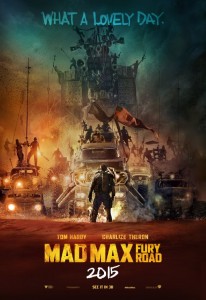 A lot of people will tell you the new Mad Max movie is a feminist film. Those people are right, of course. There are many more women with dialogue than there are men, especially after you correct for one-line extras. It passes the Bechdel test again and again. Nobody’s role is “be rescued”, even the people who are in fact being rescued; and even if it were, they are being rescued by another woman. By any possible metric, Fury Road is a film that glories in being pro-woman.
A lot of people will tell you the new Mad Max movie is a feminist film. Those people are right, of course. There are many more women with dialogue than there are men, especially after you correct for one-line extras. It passes the Bechdel test again and again. Nobody’s role is “be rescued”, even the people who are in fact being rescued; and even if it were, they are being rescued by another woman. By any possible metric, Fury Road is a film that glories in being pro-woman.
But is it a Mad Max movie? Is it even an action movie? So, I’ll be honest. I’ve seen those movies, I’m pretty sure all of them. But not since the ’80s. All I remember is Mel Gibson driving around Australia a post-apocalyptic hellscape in weaponized cars, shooting at people he was chasing or who were chasing him. That said, there’s no doubt that this is a sequel to those flicks, both visually and via the clever use of flashbacks that were not intrusive to my lack of knowledge while clearly referencing real scenes that I just couldn’t remember. And as far as action: I’m pretty sure you will not find as much concentrated adrenaline at any point during this summer season. It’s one long chase movie, and you can tell where the act breaks are written into the script because that’s the only time someone isn’t chasing someone else. Aside from one silly action movie trope about the physical toughness of a main character, there was no point where I was confident about anyone’s safety once things started, um, rolling. I have nothing bad to say about this movie that I’m not willing to immediately handwave as an aspect of the genre.
But you know what? It’s important to acknowledge the feminist angle again. Here’s why. Post-apocalyptic fiction has a habit of relegating women to victimhood. That’s what I always praise so highly about the Deathlands series that I’ve been reading, is not only that it rarely falls into that trap, but that it was written starting in the late ’80s, when nobody really cared about that kind of thing yet.
The thing about the post-apocalypse is that women will frequently be victims. This is not a particularly controversial thing to say. Men will be victims too, they just won’t survive that initial step the way women will. Human nature indicates that once power is all that matters, a lot of men will be killed, fewer women will be killed because they can be enslaved for the purposes of the men doing all the killing, and the people who are left will be tough enough to survive on their own / in their own small groups, or they will glom onto the men doing all the killing and help them so as not to be killed themselves. Which is the point. In the post-apocalyptic world, as in all worlds, feminist problems are really just humanist problems with a different word attached to them. Yes, it’s terrible that all those women have been enslaved and someone should ought to do something about it. It’s also terrible that all those men were killed on the way to where the movie started, and it’s terrible that all the boys were brainwashed by the powerful into being cannon fodder for Max (or whoever) to shoot at. None of it is the least bit okay, but the women are the face of it.
What makes Fury Road a great feminist movie is simply that women were co-equally involved in doing something about the world’s humanist problems. Maybe someday we can get there in the regular world, too.